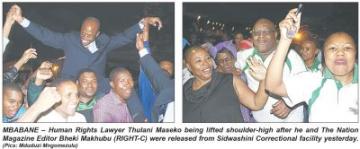BHEKI, THULANI FREED

MBABANE – After spending 20 days behind bars The Nation Magazine editor Bheki Makhubu and Human Rights Lawyer Thulani Maseko have been released.
This comes after High Court Judge Mumcy Dlamini yesterday set aside the warrant of arrest that was issued by Chief Justice Michael Ramodibedi against them. The chief justice issued the warrant of arrest on March 17, 2014 and they had been in custody since then.
The throngs of people who were in court failed to contain their emotions after Judge Dlamini pronounced that the application for setting aside of the warrant was successful. Most of those who yesterday flocked to the High Court were relatives of the accused, members of proscribed entities and representatives from civil society organisations. Some of the notable figures who were present were President of the Swaziland National Association of Teachers (SNAT) Sibongile Mazibuko, Secretary General of TUCOSWA Vincent Ncongwane, President of the proscribed PUDEMO Mario Masuku and former Motshane Member of Parliament Robert Magongo.
The judge only read the last part of the 19 page judgment, which was delivered in Court A. Maseko’s sister Dumsile, openly wept inside the courtroom after the judgment was delivered.
“I will only read the last part of the judgment. Applicants’ (Maseko and Makhubu) application succeeds, applicants’ warrant of arrest set aside and no order of costs,” said Judge Dlamini.
It was immediately after Judge Dlamini had finished reading this part of the judgment that those who were in court rose from their seats and began clapping hands in jubilation.
The alleged contempt charges against the two emanated from articles which they wrote in the monthly magazine, where they questioned the rationale behind the arrest of Chief Government Vehicle Inspector, Bhantshana Gwebu.
The accused, through their lawyers, filed an application at the High Court where they were seeking a declaratory order on the grounds that the warrant of arrest issued by the CJ was unconstitutional, unlawful and irregular. The State was, however, extraneously opposed to the application on the basis that the High Court lacked jurisdiction to grant the order being sought.
Senior Crown Counsel Vusi Kunene from the chambers of the Attorney General argued that the High Court did not have powers to review its own decision, according to the Constitution of Swaziland. Kunene argued that in terms of Section 152 of the Constitution, the High Court had powers to review decisions of all subordinate courts, tribunals and any lower adjudicating authority.
He stated that Section 148 provides that (1): “The Supreme Court has supervisory powers over all courts of judicature and over any adjudicating authority and may, in discharge of the jurisdiction, issue orders and directions for the purpose of enforcing or securing the enforcement of its supervisory power, (2) The Supreme Court may review any decision made or given by it on such grounds and subject such conditions as may be prescribed by an Act of Parliament or rule of court, (3) In the exercise of its review powers, the Supreme Court shall sit as a full bench”.




 del.icio.us
del.icio.us Digg
Digg
Comments (4 posted):